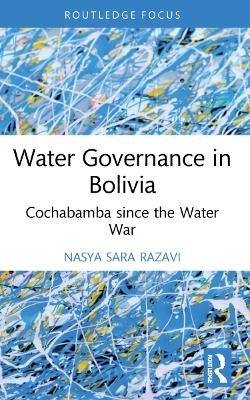
Water Governance in Bolivia
Routledge (Verlag)
978-0-367-77017-4 (ISBN)
This book examines water remunicipalization in Cochabamba since the Water War, offering innovative methodological and theoretical conceptualizations of what it means to be "public," helping to move debates on water services beyond the paralyzing binary of public versus private with a focus on the contested terrain of community engagement around water services.
The Cochabamba Water War of 2000 brought together city residents of all stripes to mobilize against water privatization and gain back public control of the city’s water utility. This event catapulted anti-privatization movements around the world, but two decades later, the water movement’s vision of democratic water provision remains largely unfulfilled and the city suffers from a protracted water crisis. Building a typology of participation, this book explores the difficulty in rebuilding a strong public water service in Cochabamba by analyzing the different, and often incompatible, understandings and interpretations of social control and public participation. Applying this framework to the Bolivian context, and more specifically to the water and sanitation sector in Cochabamba, the book uncovers whose interests are served, and which groups are included or excluded from decision-making and access to water. This exercise illustrates how, in their implementation, participatory practices are not linear and can be distorted or appropriated towards different ends.
This book will be of great interest to students and scholars of water governance, natural resource management, public policy, social movements and Latin American studies.
Nasya Sara Razavi received her PhD in Human Geography at Queen’s University, Canada. Her research lies at the intersection of urban transformations and inequalities in peri-urban Bolivia, as changing infrastructure and severe water shortages shape public participation, gendered insecurities, and everyday practices. She is currently Research Associate at the City Institute at York University, Canada, and lead researcher for the Cochabamba team on the feminist comparative urban research project GenUrb (Urbanization, Gender, and the Global South: A Transformative Knowledge Network).
1. Introduction: Remunicipalization 2. Protracted water crisis in the garden city 3. What is social control? A typology of public participation 4. "Semapa es de los Cochabambinos": Participation and social control in the Cochabamba water sector 5. Participatory mechanisms beyond Semapa 6. Conclusion: Building a common path
| Erscheinungsdatum | 14.03.2022 |
|---|---|
| Reihe/Serie | Routledge Focus on Environment and Sustainability |
| Zusatzinfo | 7 Tables, black and white; 8 Halftones, black and white; 8 Illustrations, black and white |
| Verlagsort | London |
| Sprache | englisch |
| Maße | 138 x 216 mm |
| Gewicht | 453 g |
| Themenwelt | Naturwissenschaften ► Biologie ► Ökologie / Naturschutz |
| Sozialwissenschaften ► Ethnologie | |
| Sozialwissenschaften ► Soziologie ► Spezielle Soziologien | |
| Wirtschaft ► Volkswirtschaftslehre | |
| ISBN-10 | 0-367-77017-2 / 0367770172 |
| ISBN-13 | 978-0-367-77017-4 / 9780367770174 |
| Zustand | Neuware |
| Informationen gemäß Produktsicherheitsverordnung (GPSR) | |
| Haben Sie eine Frage zum Produkt? |
aus dem Bereich


